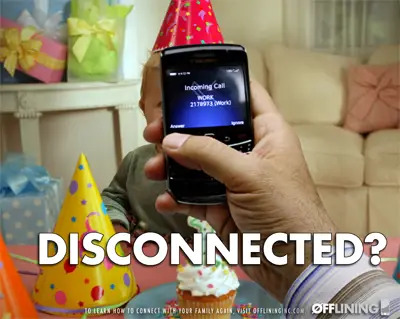Face it: You’ve got cramps in your thumbs from using the smartphone that’s practically attached to you 24/7. And your kids? They’re busy listening to their iPods, texting, playing video games, and gazing at their computers – all at the same time. Technology is great, but it’s changed the way families communicate and spend time together. Read on to find out how some families found a way to shut down – and how yours can to!

Staten Island resident Tommy Romano says his wife Tabatha’s phone habit was seriously impacting their relationship. “It was obsessive. Every time we were together, she was texting or on Google, and I found it very annoying and rude,” says Romano.
It was so hard for Tabatha to part with her phone that she would use it while at family functions or when they were out with friends. She admits, “It was like an addiction. If it was on me and it buzzed, I would look at it.”
In May, a turning point occurred in their relationship when the couple, who have an 8-year-old son together, appeared on the NBC show The Marriage Ref. Tabatha says she realized multitasking wasn’t really possible, and it was not only upsetting Tommy, but it was actually taking time away from her family. Now she strategically leaves her phone in another room when it’s family time so she’s not distracted. “I’m more attentive, and I can focus on the here and now. Being on the phone less has improved the quality of my family interactions as well.” Tommy agrees. “We interact more and we’re spending more time together,” he says.
The Romanos’ story is not unlike that of other families in America. According to a survey conducted for Sheraton Hotels and Resorts, more than one-third of smartphone users said if they were forced to choose, they’d pick their gadget over their spouse. Although no one would argue that technology has made our lives easier, and studies show that the Internet can actually make us smarter, it’s altering the quality of family life.
In a nationwide, four-day poll conducted by The New York Times, one in seven married men and women said technology caused them to see less of their spouses, and one in 10 reported spending less time with their children. Some families can’t even unplug during vacations, using the Internet for both business and pleasure. “Campground operators increasingly find that if they don’t offer Wi-Fi service, they will lose business to parks that do,” says Linda Profaizer, president and CEO of the National Association of RV Parks and Campgrounds. Remember when camping was meant to help us get away from it all?
With all this time spent clicking, texting, and updating our status, it’s no surprise that excess use of technology is making us – and our kids – more impatient, impulsive, narcissistic, and stressed out.
According to the journal Pediatrics, children spend as many as seven hours a day consuming media. And a study by the Pew Research Center found that teens alone are sending as many as 100 texts a day. All of this can translate into serious health implications.
“When you think about all of that time that children are spending texting or playing video games, that’s time taken away from all the other important developmental activities that are crucial for their emotional, social, and physical well-being,” says Caroline Knorr, parenting editor for Common Sense Media, who notes that overexposure can result in lower school readiness, a lower literacy rate, and obesity. And although kids are pros at multitasking, this habit actually compounds their overall media use for the day. “If you’re instant messaging, listening to your iPod, and playing a game, that’s times three,” explains Knorr.
Time for Change
“Everything’s getting faster and faster,” observes Eric Yaverbaum, a self-professed gadget junkie who, along with his business partner Mark DiMassimo, recently launched  an initiative they call Offlining. The two Westchester dads are not anti-technology – quite the contrary, technology has been crucial to their success. For the past two decades the pair have spent their careers (Yaverbaum in public relations, DiMassimo in advertising) persuading people to log on, click, and communicate. Now, though, they’re advocating the off button. “I guess we made a mistake – we took our eyes off the screen long enough to see that we have families,” explains Yaverbaum. “While everybody is promoting more and more speed, efficiency, technology, and gadgets, nobody is saying ‘reserve a little bit of your time for some good old-fashioned values.’ “
an initiative they call Offlining. The two Westchester dads are not anti-technology – quite the contrary, technology has been crucial to their success. For the past two decades the pair have spent their careers (Yaverbaum in public relations, DiMassimo in advertising) persuading people to log on, click, and communicate. Now, though, they’re advocating the off button. “I guess we made a mistake – we took our eyes off the screen long enough to see that we have families,” explains Yaverbaum. “While everybody is promoting more and more speed, efficiency, technology, and gadgets, nobody is saying ‘reserve a little bit of your time for some good old-fashioned values.’ “
For Susan Maushart of Mattituck, shutting down in a major way was the only way for her and her three teenage children to break their addictions to technology. “I was worried about my kids – how they seemed to be living their lives ‘screened,’ ” says Maushart, who wrote about her family’s six-month experiment in her comedic book, The Winter of Our Disconnect (Tarcher, January 2011). “You know how you’re not ready to go to rehab until you reach rock bottom? Well, we’d reached it.
|
with your family! |
It was a case of desperate times calling for desperate measures.”
Maushart says her motivation for the experiment also had a lot to do with her curiosity about whether being online 24/7 really was essential for her kids’ learning (or was is just something the kids told her to squeeze in more tech time?). “We were so totally connected, yet so worryingly disconnected,” she says. After the initial two weeks when she turned off all electricity in her home, everyone was forbidden from using anything electronic in the house or in the car. The kids were allowed to use the Internet at school or at friends’ houses for homework. Yet ironically, her kids’ friends wanted to spend time at their house. “The novelty value of a home where ‘hanging out’ meant talking, playing board games, and cooking proved irresistible. Go figure.” Susan was forced to do all her writing by hand, check out books from the library, and read the newspaper – in old-fashioned print.
 The most challenging part of the experiment was finding activities to fill the time. “That was part of my evil plan: I wanted them to experience boredom, and then to experience taking responsibility for alleviating it in more self-reliant, novel, creative ways.” After the experiment ended, Maushart says she and her family realized the importance of making choices about media. She says her kids were shocked to discover how much time their media habits were taking up each day. And their biggest reward was the quality of their interactions as a family.
The most challenging part of the experiment was finding activities to fill the time. “That was part of my evil plan: I wanted them to experience boredom, and then to experience taking responsibility for alleviating it in more self-reliant, novel, creative ways.” After the experiment ended, Maushart says she and her family realized the importance of making choices about media. She says her kids were shocked to discover how much time their media habits were taking up each day. And their biggest reward was the quality of their interactions as a family.
“We got closer – much closer. We had more fun, and we connected. That was the prize, really.”
According to Caroline Knorr, “Media has almost become the other parent in kids’ lives.” She says that parents in general don’t know how to set rules and limits around technology in order to create a balance in their family’s lives, partly because they don’t fully understand the technology their kids are using. Marketers are also frequently devising new ways to target kids, purposely leaving parents in the dark. “Media is so important to your kids, and also very influential. When you’re involved in their media lives, you can continue to exert your influence over their consumption,” she says.
|
Guiding children to become responsible consumers and critics of media can in turn help them make choices and limit their tech time. Here are some tips to get your family started:
Be a role model. Put away your own smartphone and make an effort to step away from the computer at certain times. Only use the phone with a hands-free device, even if it’s just one call. Doing otherwise “sends a message to your kids that it’s okay to get away with things when it comes to media,” says Knorr.
Enjoy media with your kids. Select a few shows that you like, or watch them on DVR. Set a time limit and stick with it.
Learn the technology. Not only will you have a better understanding of what they’re doing, but you’ll be able to help your kids make appropriate choices about what they’re consuming. “If you understand how Facebook works, you’re in a much better place to talk with your kid about how to use it responsibly,” says Knorr.
Choose age-appropriate media – and talk. Sit with your kids when they play a game, watch TV together, and talk to your children about what they’ve seen or what they’re learning. “It creates a more conscious memory of the experience, and that is what is going to continue that relationship of talking about the media,” says Knorr.
Set goals and limits. If your kids are texting all day long, it makes it that much more challenging (even unlikely) for them to get their homework done, spend time with family, and participate in extracurricular activities. Talk to them about their overall goals for their day and their lives and where media fits in. Setting rules (like no texting allowed during homework or dinner time) is also a good approach. And be sure to explain your reasons why!
|
Okay, Time to Plug Back In
Some recommendations for when you are online (it’s inevitable, of course – and besides, we’re advocating setting limits, not going cold turkey!):
• Download our Offlining Pledge form to fill out and proudly display on your fridge as a reminder of your Offlining commitment.
• Link to our Facebook page to share your success stories and ideas for the most creative ways to spend your non-tech time.
• Participate in more likeminded initiatives, such as community game nights and national “turnoff weeks,” and find lots of helpful tools and research.
• Get age-by-age advice on all kinds of media consumption from this nonpartisan, nonprofit org, including reviews and a discussion forum.
• Read the blog “Mom Unplugged” by a mom of three who has been without a TV in the home for eight years. But she’s no hater: She allows DVDs in moderation, and, as she writes, “I simply feel a need to moderate the amount of technology my children are exposed to so that they have time to be children. I want them to play outside, to use their imaginations, and to learn how to entertain themselves without a screen.” Check it out for some great ideas and inspiration.
• Offlining cofounder Mark DiMassimo quotes his father, who designed integrated circuits for a living (from the first speed dial to a giant particle accelerator) on the site: “We invent technology to be our servant, not our master.” You’ll find some persuasive arguments for unplugging, all with a great sense of humor and polish. At press time, they had garnered almost 11,000 pledges for “10 no-device dinners” leading up to Thanksgiving.
|
By the Numbers Some recent stats to help you put things in perspective:
The oft-cited recommendations have been around for a while: no television or other electronic media for children two years of age and under, and one to two hours of total screen time per day recommended for kids over two (whether TV, computer, or smartphone). The reality, though, is that most don’t come close to adhering to these guidelines.
Sources: Kaiser Family Foundation; Nielsen 2010; Pediatrics, the journal of the AAP; The New York Times
|











